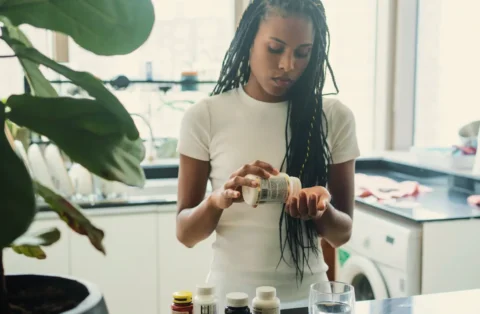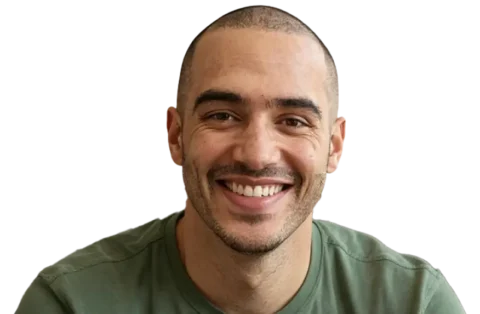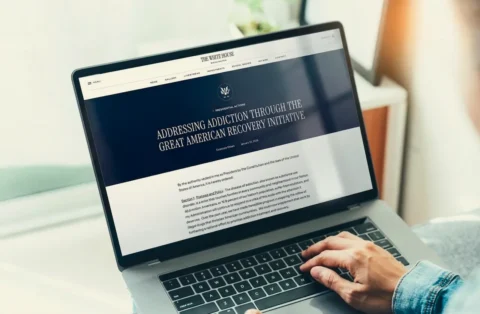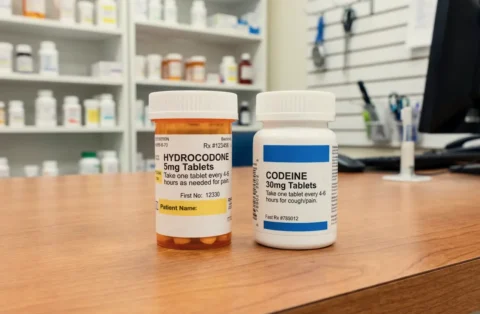What you’ll learn
You’ll learn how nutrition and supplements can help support your recovery from opioids. We’ll discuss what’s backed by evidence, popular remedies to approach with caution, and how a licensed provider can help you take control of your recovery.
When opioid withdrawal starts, the physical and emotional symptoms can be overwhelming. The aches, the restlessness, the nausea. They make it hard to think about anything except getting through the next hour.
It’s completely understandable that people search for relief online. From vitamins to herbs and home remedies, forums and social media are full of suggestions. Some ideas might help. Others don’t work. And some can even make things worse.
In this guide, we’ll help you separate helpful strategies from harmful hype. We’ll walk through what’s actually backed by science, what supports your body during withdrawal, and (most importantly) how to use nutrition and supplements alongside medical treatment, not instead of it.
What does the research say about using supplements for opioid withdrawal?
When you’re exhausted, sore, and emotionally raw, anything that promises a little relief feels worth trying. It’s one of the main reasons why people may turn to supplements when they’re going through withdrawal.
But not all supplements are safe or effective. In fact, if you’re taking part in a Medication-Assisted Treatment (MAT) program, some medications can interfere with your treatment. Let’s look at what might help, what’s uncertain, and what could do more harm than good.
Supplements that may support your recovery
Some supplements have shown potential to ease specific symptoms during opioid withdrawal, but they should be used more like a supportive tool, not as a replacement for medical care or good nutrition.
In early recovery, it’s common to have low nutrient levels. During active addiction, many people aren’t able to eat regular, balanced meals. That’s why it’s important to focus on consuming healthy foods like vegetables, fruits, whole grains, and enough protein (especially lean protein) to help your body heal, but also to support your recovery over time.
If you’re concerned about your nutrient levels, taking a multivitamin a day can help you. It’s important that you always check with your provider before starting anything new, especially if you’re on medication like Suboxone®.
Magnesium
Magnesium helps your muscles relax, and your nerves communicate smoothly. During withdrawal, it may help with cramping, restless legs, and sleep. Many people are already low in magnesium, especially during times of stress or poor appetite. If you try it, magnesium glycinate is often gentler on the stomach than other forms. Beware, however, that too much magnesium can cause diarrhea.
B-Complex Vitamins
B vitamins (like B1, B6, and B12) help your nervous system function and turn food into energy. While not specific to withdrawal, B vitamins can help your body handle stress and reduce the crushing fatigue many feel early in recovery.
Vitamin C
Vitamin C is a helpful antioxidant that supports your immune system. Some studies suggest high-dose vitamin C may reduce withdrawal symptoms. However, this should only be done under medical supervision.
Vitamin D
Vitamin D plays a role in mood regulation and brain health. Research shows many people living with OUD have low vitamin D levels, which may worsen depression, fatigue, and pain sensitivity during recovery.
While more studies are needed, correcting a deficiency (confirmed by a blood test) may support overall well-being. Sunlight, fatty fish, and fortified foods help, but supplements are often needed, especially in winter or if you spend little time outdoors.
Zinc
Zinc supports immune function and wound healing. People in early recovery often have lower zinc levels, which may contribute to irritability, poor sleep, and weakened immunity. One clinical trial found that zinc supplementation, combined with standard treatment, helped reduce withdrawal severity and cravings. It’s not a magic wand, but if you’re deficient, replenishing zinc may help your body stabilize faster.
Acetyl-L-Carnitine
Acetyl-L-Carnitine (ALCAR) is a compound your body makes naturally. It helps deliver energy to your brain cells and may protect nerves from stress. Early research suggests it could reduce pain and improve mood during opioid withdrawal. It’s found in small amounts in red meat and dairy, but therapeutic doses usually require a supplement.
L-theanine
L-theanine is a calming amino acid found in green tea. It hasn’t been studied specifically for opioid withdrawal, but research shows it can lower anxiety, improve sleep quality, and support mental focus when you need it during the early stages of recovery. In one placebo-controlled study, people who took 200 mg of L-theanine daily for four weeks reported lower stress and anxiety, better sleep, and sharper memory.
Supplements with mixed evidence
Some supplements sound promising, but don’t have as much science behind them. Others may help in some situations, but come with additional concerns. That’s why it’s important to talk with your provider to make sure any supplement you’re considering during recovery will work for you.
CBD (Cannabidiol)
CBD is often promoted for anxiety and sleep. Some early research is promising. In one study, over half of the participants reported better sleep and reduced anxiety within a month. Another small trial found that CBD may reduce drug cravings and anxiety in people recovering from heroin use.
But there are risks. Many CBD products are poorly regulated. Many contain inaccurate doses or even THC, which can trigger relapse or complicate treatment.
If you’re considering trying it, talk to your provider first. They can help you weigh the benefits and check for any interactions with medications like Suboxone®. CBD may help with certain symptoms, but it’s not a substitute for proven, evidence-based treatment.
Valerian Root
Often used as a sleep aid, valerian may help with mild insomnia. But most studies focus on general sleep issues, not withdrawal. While it’s usually safe short-term, it’s best to talk with your provider before adding it to your recovery routine.
DL-Phenylalanine (DLPA)
DLPA is thought to boost endorphins (your body’s natural feel-good chemicals). But there’s no strong evidence that it helps with opioid withdrawal. Because it affects brain chemistry, it’s not something to try without medical guidance, especially if you’re on other meds.
Supplements to approach with caution or avoid
Some substances are marketed as natural “detox” tools, but can actually make things worse. It’s important to stay safe, especially when your body is already vulnerable.
St. John’s Wort and 5-HTP
Both affect serotonin, a key brain chemical for mood. But they can cause a dangerous condition called serotonin syndrome if mixed with antidepressants, Suboxone®, or other meds. St. John’s Wort also reduces the effectiveness of buprenorphine, making your treatment less reliable. Never use either without guidance from your provider.
Proprietary “detox” blends
Always avoid products with vague ingredients and bold promises. They often combine multiple herbs and supplements in unknown amounts, which makes it hard to know what you’re actually taking, or how it might interact with other medications.
Does opioid withdrawal affect your body’s nutritional needs?
Opioid withdrawal doesn’t just affect your mood or comfort. It also impacts your whole system. Opioids affect how your brain manages things like pleasure, motivation, and emotional regulation. When you first stop using, your brain needs time to recalibrate. This can leave you feeling anxious, low, or mentally foggy.
During withdrawal and early recovery, your body is in full reset mode, and your system is working overtime to regain balance. That takes extra nutrients. We’ll walk you through some tips for eating well during withdrawal and how certain foods can help you start feeling better during recovery.
Digestive issues during opioid withdrawal can lead to dehydration
Nausea, diarrhea, and a lack of appetite are common during withdrawal. These can lead to dehydration and loss of key nutrients when your body needs them most.
Tip: Sip broth, coconut water, or oral rehydration solutions. Eat small, bland snacks like bananas, crackers, or applesauce if you’re not up to eating a full meal.
Cortisol and inflammation spike during opioid detox
Withdrawal puts a real strain on your system, both physically and emotionally. Cortisol (the stress hormone) tends to increase. So does inflammation, which may worsen aches, tension, and fatigue.
Tip: Anti-inflammatory foods, like those rich in omega-3s (like walnuts, salmon, herring, and chia seeds), may help soothe some of that internal stress.
You lose essential nutrients through sweat and sleep disruption
Night sweats and disrupted sleep can deplete magnesium, potassium, and sodium. These minerals are essential for nerve function, hydration, and muscle control.
Tip: Replenishing them with nourishing foods and drinks can make a real difference in how you feel day to day. Have sports drinks (like Gatorade) on-hand or even packets of Saltine crackers to help restore electrolytes. Light foods, like bananas or applesauce, can help balance your blood sugar, too.
Nutrition strategies to support opioid withdrawal
Food and hydration won’t erase withdrawal symptoms, but they can help you feel steadier as you work through this part of your recovery.
When nausea, anxiety, or exhaustion are front and center, it might not be easy to eat something. That’s okay. Start small. Be kind to yourself. Even tiny, consistent acts of nourishment add up.
Why hydration should be your top priority
Dehydration is one of the most common and overlooked risks during withdrawal. Nausea, diarrhea, and night sweats can drain your body of fluids faster than you realize, leaving you more fatigued, dizzy, or achy.
Chugging a lot of water in one sitting might seem helpful, but it can actually flush out electrolytes (the minerals your nerves and muscles need to function). Instead, sip steadily throughout the day.
Try these options:
- Clear broths (chicken, vegetable, or bone broth): They replace sodium, which helps your body hold onto water and keep blood pressure stable. This can be helpful if you’re feeling lightheaded.
- Coconut water: A natural source of potassium, which helps reduce muscle cramps and supports heart rhythm. It’s also usually easier on a sensitive stomach than sugary sports drinks.
- Low-sugar electrolyte drinks: These restore balance without overwhelming your system. Look for ones with minimal added sugar. They’re also easier on your stomach when your gut is fragile.
If eating feels out of reach right now, focus on staying hydrated. It can go a long way to ease headaches, reduce fatigue, and keep your body more resilient.
Soothing foods for digestive discomfort
Your stomach might feel like it’s doing somersaults. That’s normal. To help you start feeling better, start with easy-to-digest foods:
- The BRAT diet (bananas, rice, applesauce, toast): Bland, binding foods that calm an upset stomach.
- Plain oatmeal or mashed sweet potatoes: They provide steady energy without irritation.
- Smoothies with fruit and a spoon of nut butter: If solids are hard to manage, liquids can still nourish you.
Small, frequent bites every 2–3 hours can often work better than full meals. Don’t put added pressure on yourself. Even a few bites count as progress.
Foods that may ease muscle tension and sleep issues
Restless legs and muscle cramps are common during withdrawal, and they can make sleep feel impossible.
Certain nutrients may help ease this tension:
- Magnesium-rich foods like leafy greens, pumpkin seeds, and almonds can help your muscles relax and your nerves stay calm.
- Potassium sources like bananas and avocados can help reduce cramping.
- Complex carbs like whole grain toast or brown rice can help your brain produce serotonin, which supports better sleep.
Some people find that a small, carb-rich snack before bed can help them sleep better. Something simple, like warm toast or a bit of oatmeal, can be a great pick.
Anti-inflammatory foods for overall comfort
While food won’t stop withdrawal, anti-inflammatory options may reduce discomfort and help ease symptoms.
These include:
- Fatty fish like salmon or sardines
- Ground flaxseeds in oatmeal or smoothies
- Walnuts, berries, and dark leafy greens
If cooking feels like too much, even a spoonful of peanut butter or a handful of walnuts can give you the energy boost you need.
Common myths about nutrition and supplements for opioid withdrawal
When you’re in the thick of withdrawal or supporting someone who is, it’s natural to turn to whatever feels hopeful. But unfortunately, not all the advice out there is helpful, safe, or accurate.
Let’s unpack common myths that can unintentionally steer people away from care that truly helps during recovery.
Myth 1: You can detox from opioids at home with supplements
The truth: While hydration, food, and certain supplements support your body, opioid withdrawal can be medically risky, especially if you’ve used high doses or have other health conditions. Complications like severe dehydration, irregular heart rhythms, or intense mental health symptoms can bubble up quickly.
Myth 2: “Natural” means it’s safe
The truth: Just because something is natural doesn’t mean it’s safe. The fact that something is plant-based doesn’t make it harmless. Some natural supplements can interfere with medications or cause unpredictable side effects. That’s why it’s always best to talk to a medical provider before adding any supplement to your recovery routine, even if it’s sold over the counter.
Myth 3: If it helped one symptom, it can replace treatment
The truth: Recovery is complex. Everyone’s timeline and experience are different. You might find that a certain tea helps with sleep, or magnesium eases leg cramps. While these options can be helpful, they don’t give you the full set of tools to manage OUD that treatment does.
MAT works on multiple levels: easing cravings, managing withdrawal, and reducing relapse risk. Working with a provider who understands what you’re going through can help you take control of your recovery and your health.
Myth 4: Nutrition can replace Medication-Assisted Treatment (MAT)
The truth: A nourishing diet can help your body heal, but it can’t stabilize brain chemistry disrupted by opioid use. Trying to substitute food or supplements for proven treatments may delay recovery or even increase the risk of relapse.
Instead, think of nutrition as a support tool, not a stand-alone solution.
How QuickMD supports safe, effective withdrawal management
You don’t have to navigate withdrawal alone or rely on guesswork from internet forums. With the right support, withdrawal becomes less overwhelming.
Help with supplement safety and side effects
Thinking of adding magnesium? Wondering if your CBD oil could interfere with Suboxone? Your provider can review any supplements you’re using or considering and help you make informed choices without any judgment. Our team can help you:
- Flag potential interactions (with Suboxone or other medications)
- Suggest safer alternatives
- Help you avoid products that could do more harm than good
Care that evolves with your recovery
As your needs change, so will your recovery plan. Your provider sticks with you wherever your recovery journey takes you. Whether it’s adjusting your medication, helping with cravings down the road, or offering mental health support referrals, if you ever have a question or need extra support, we’re available 7 days a week (including holidays).
Ready for the next step?
The most effective recovery plans are integrated. They blend medical treatment, like Suboxone, with smart nutrition choices, safe supplements (when appropriate), and behavioral support like therapy or peer groups.
Frequently asked questions about nutrition and supplements for opioid withdrawal
Can supplements treat opioid withdrawal on their own?
No. Supplements can support your body during withdrawal, but they can’t treat the root causes. They’re supportive tools, not a replacement for treatment. Withdrawal happens when opioids alter your brain’s reward and stress systems. While good nutrition can help, evidence-based medications like Suboxone remain the safest and most effective option for managing symptoms and reducing cravings.
Can I safely detox at home using just vitamins and supplements?
We strongly advise against it. Opioid withdrawal can lead to dangerous dehydration, electrolyte imbalances, or mental health crises. Recovery is tough, but you don’t have to do this alone. Speak to a medical provider who can help you stay safe or connect you with treatment to help support your recovery.
Should I tell my doctor if I’m using any herbs or over-the-counter supplements?
Absolutely. Some supplements can interfere with medications or worsen symptoms. Let your provider know everything you’re taking, even if it seems harmless. Your provider can help you evaluate what’s safe and what to avoid.




